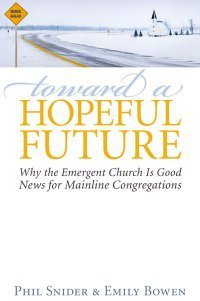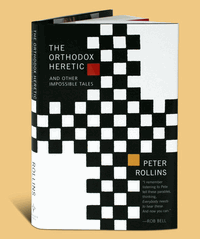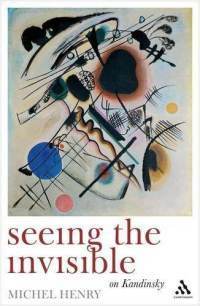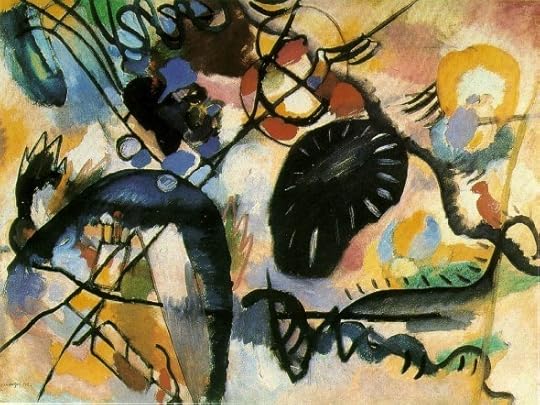Peter Rollins's Blog, page 54
May 18, 2011
What is Your Biggest Regret?
Came across this video via my friend Padraig O Tuama
May 9, 2011
On Consumption, Vomiting and Eating with Others
One evening a young man who is returning home after a long and tiring day at work gets a call from his concerned wife,
"Dear, be careful on the way home as I just heard on the radio that some crazy guy has been spotted going full speed the wrong way up the freeway"
"Sorry love" he shouts back, "can't talk right now… there isn't just one nutter, there are hundreds of them!!!"
—
One of the interesting things to note about this little anecdote is the way that the husband does not even entertain the possibility that he might be going the wrong way. Rather he takes it for granted that he is right. This is not a belief that he is conscious of, rather all his conscious thoughts are filtered through this belief.
This situation is sadly all too common. Let us approach this idea by briefly reflecting on how we encounter people with different political, religious and/or cultural values to our own. When faced with such a confrontation (that society all too often attempts to protect us from) our primal response is often one of either,
Consumption – Attempting to dissolve their difference by integrating them into our social body (making them like us)
Vomiting – Rejecting them from our social body as a foreign agent that must be expelled (protecting the integrity of our body)
Of course, most educated and enlightened communities attempt to avoid these very natural tendences, opting instead for a more reflective position that gets beyond these extremes of consuming the other or vomiting them out. This more thoughtful position can be described as eating with the other. Here the community seeks to sit down with the other and seek out places of convergence.
However this third position still operates from the same underling belief as the others,
Consumption – We are right and you are wrong. We shall integrate you
Vomiting – We are right and you are wrong. We shall reject you
Eating with – We are both right in some substantial way. Let us reflect upon where we converge and move forward together
In each of these cases we seek to exorcise or downplay the monstrosity of the other (their bizarre practices and beliefs). But what if one of the truly transformative encounters with the other is not where we try to annihilate their monstrosity (by abolishing it, rejecting it or domesticating it), but by coming into contact with our own monstrosity through it? In this alternative type of encounter we glimpse how we look through their eyes and begin to ask whether our beliefs and practices are just as strange.
This is the subject of a book that I am currently writing.
May 8, 2011
Mysticism, Kandinsky and abstract art
This is a short excerpt from a talk I gave recently in New York City where I explored the world of mysticism through reference to the abstract artist Wassily Kandinsky and the life of Mother Teresa.
May 6, 2011
Take heart… there is Hope!
I remember, when I was young, reading a short story by the great Philip K. Dick about a man who discovers that insects are highly evolved beings intent on destroying humanity. If I remember correctly the insects communicate to one another through a form of ESP that the man is suddenly able to pick up.
He gains this unusual skill purely by accident late one evening while sitting in his house. The insects that he overhears quickly realise and immediately send out a message to millions of other insects, telling them that the man must die.
Within a matter of seconds a mass of insects start appearing from everywhere. They ooze out of cracks in the wall, they slide through the slit beneath the door, and they flood from the gaps between the floorboards.
But just as it would seem that everything is lost dozens of spiders drop down from the ceiling and form a circle around the terrified man. One of these spiders addresses him saying, "You have discovered that the insects of the world are here to destroy humanity, but don't worry we spiders have been placed here to protect you".
The vast sea of insects edge ever closer as the spiders close ranks around the distraught man.
"Is there any hope?" he cries as the insects circle around him in their millions
"It's difficult to say," replies one of the spiders, "there are so many of them. But we think there might be hope, so be courageous"
Soon the other insects reach the circle of spiders and begin the overrun them.
Again the man pleads to the spiders, asking if there is any hope and again they reply with a cautious "yes".
More minutes pass and soon the insects are crawling all over the man, millions of them. They begin to overrun his body and sliver into his various orifices.
"What's happening" chokes the man to one of the few remaining spiders, "I thought you said there was hope"
"There is," replies the spiders, "I promise that there is"
"But I am dying" he shouts with his last breath, "they are killing me"
"Oh" replied the spider, before succumbing to the flood of insects, "I'm sorry, but we never meant that there was hope you. We mean that there might just be hope for your species"
As I reflect upon this story I am reminded of how much I want there to be hope for me… for my circle of friends… for my life. But perhaps this very narrow understanding of hope is not only misguided, but actually oppressive.
For there is a necessary shadow side to the belief that there is hope for me as I face my own demise and it is the sense that there really is no hope at all. These are not two separate realities but rather intimately tied to one another as heat is to light. Both of these feelings are centred upon me and focus upon my tightly bounded circle of reality.
But there can be a profound sense of peace as we expand the concept of hope beyond ourselves and the idea of our own longevity. Whether or not we will persist as an individual is not settled one way or the other when we expand our understanding of hope but rather becomes irrelevant (whether one believes in it or not). Rather we find a certain comfort in seeing ourselves as part of something much bigger, as participating in the ongoing manifestation of life herself. And that, whether or not there is any hope for us, there might just be hope for life, hope that she will eternally spring forth from the dark void of nothingness.
May 4, 2011
Is this a Sign of the End Times?
So my guess is that because my last post was so confusing about when The Orthodox Heretic was actually going on sale my publishers started the discount early (they love me really)!
So here is the deal. For two weeks you can buy The Orthodox Heretic on Kindle for only 99c (and no, not on Nook, Cranny, paper, parchment, golden plates, the Turin Shroud or any other medium you can think of, so don't ask).
I know you probably can't believe it as this is pretty much like winning the lottery, seeing a unicorn or working out whether God can actually make a breakfast bigger than God can eat. But let me reassure you that it is indeed true. In fact I think that this phenomenon might even be one of the signs of the End Times (which should be happening on May 21st).
My hope is to sell out the ebook, which people say is impossible, but I say is inevitable. So please do your bit by buying, gifting and spreading the word.
Thanks!
May 3, 2011
The Orthodox Heretic for 99c on Kindle!
All of us have burdens to bear and sufferings to endure, but there are also areas of our lives that bring pleasure and satisfaction. One of the blessings in my own life has been a strong sense of purpose. By this I don't mean that an angel visited me as an infant or that I happened upon some golden plates in a forest. In fact most of time I have no idea what I am doing or what the point of it is. Yet, from the age of seventeen, I have had a feeling that I was supposed to be doing it!
However, while I believe in what I am doing, this is accompanied by a deep and abiding dislike of promoting what I do. Promotion of ones own work is too often little more than a thinly disguised desire to promote oneself; and if ones ideas are simply a means of promoting oneself then they are likely to be very poor ideas that change as often as public opinion does.
So it causes a bit of dilemma. Obviously I want to get my work out there but I also don't want to buy a white suit and tell people that it will change your life (I am reminded of how The Purpose Driven Life begins by informing us that the book is so important God planned for us to read it from before we were born, and that it is so amazing it will change our life). OK, so maybe I secretly want the white suit… but anyway the point of all my rambling is to say this,
- I have a suspicion that God doesn't care that much about my books (God has got bigger things to worry about and, from what I have heard, is obsessed with the Left Behind series)
- I doubt my work will change your life (at least not in the way that falling in love, losing a friend, having a child, or going through a breakup will)
- And I am skeptical of anyone who claims such things of their musings
But, having said all that, I do think that my work might be worth 99c! So from this Wednesday (4th May) The Orthodox Heretic will be available on Kindle for 99c (and will remain at this price for two weeks).
Now because this is just being advertised on my blog, twitter and facebook pages it is likely that many of the people who hear about this will already own the book. So here is where you come in. If you liked it and have a few dollars to spare please think about gifting the book to others. Also it would be wonderful if you could spread the word. After all God thinks my books are amazing and they have the power to transform your life… now where is that white suit…
The Orthodox Heretic for 99c on Kindle (from Thursday 5th)!
All of us have burdens to bear and sufferings to endure, but there are also areas of our lives that bring pleasure and satisfaction. One of the blessings in my own life has been a strong sense of purpose. By this I don't mean that an angel visited me as an infant or that I happened upon some golden plates in a forest. In fact most of time I have no idea what I am doing or what the point of it is. Yet, from the age of seventeen, I have had a feeling that I was supposed to be doing it!
However, while I believe in what I am doing, this is accompanied by a deep and abiding dislike of promoting what I do. Promotion of ones own work is too often little more than a thinly disguised desire to promote oneself; and if ones ideas are simply a means of promoting oneself then they are likely to be very poor ideas that change as often as public opinion does.
So it causes a bit of dilemma. Obviously I want to get my work out there but I also don't want to buy a white suit and tell people that it will change your life (I am reminded of how The Purpose Driven Life begins by informing us that the book is so important God planned for us to read it from before we were born, and that it is so amazing it will change our life). OK, so maybe I secretly want the white suit… but anyway the point of all my rambling is to say this,
- I have a suspicion that God doesn't care that much about my books (God has got bigger things to worry about and, from what I have heard, is obsessed with the Left Behind series)
- I doubt my work will change your life (at least not in the way that falling in love, losing a friend, having a child, or going through a breakup will)
- And I am skeptical of anyone who claims such things of their musings
But, having said all that, I do think that my work might be worth 99c! So from this Thursday (5th May) The Orthodox Heretic will be available on Kindle for 99c (and will remain at this price for two weeks).
Now because this is just being advertised on my blog, twitter and facebook pages it is likely that many of the people who hear about this will already own the book. So here is were you come in. If you liked it and have a few dollars to spare please think about gifting the book to others. Also it would be wonderful if you could spread the word. After all God thinks my books are amazing and they have the power to transform your life… now were is that white suit…
May 2, 2011
Toward a Hopeful Future
 Toward a Hopeful Future is a beautifully crafted book that highlights the ways that mainline communities of faith can experience hope, encouragement, and renewal by embracing the some of the contemporary theological discussions taking place at the very fringes of church life.
Toward a Hopeful Future is a beautifully crafted book that highlights the ways that mainline communities of faith can experience hope, encouragement, and renewal by embracing the some of the contemporary theological discussions taking place at the very fringes of church life.
In addition to other thinkers and practitioners Phil Snider and Emily Bowen have taken time to understand and outline the work that I have been undertaking in recent years. As such they have given us a painstakingly researched work that not only places the reader's hand on the pulse of the new theology but draws out how this contemporary discourse relates to, and resonates with, the wider Christian heritage.
To purchase the book click here
April 27, 2011
Seeing the Invisible
This is a beautiful book written by the philosopher Michel Henry that explores the work of Wassily Kandinsky. What Kandinsky is exploring in his art has something beautiful to say about faith, spirituality and theology. Something I touch on in my blog post entitled Faith is not Belief.
Faith is not belief
Now faith is being sure of what we hope for and certain of what we do not see
Hebrews 11:1
Today faith is most often taken to refer a way of holding propositions. In other words, faith is considered to be a mode of belief. To be precise faith is thought of as a way of firmly believing something that lacks sufficient evidence to know beyond reasonable doubt. Here are a few examples,
- I have faith that John will remember to pick us up
- I have faith that the rain will clear up later today
- I have faith that my partner will come back to me
In each of these examples the individual who asserts them believes that something will happen in the absence of overwhelming evidence (indeed, for some, faith increases in direct proportion to the decrease in evidence). This will become more clear as we contrast the above expressions with statements that we would not likely hear or utter,
- I have faith that 2 plus 2 equals 4
- I have faith that the film will start at the time it is scheduled to show
- I have faith that the milk I put in the fridge will be there when I open the fridge door [unless, of course, you live with people who might drink it]
The point here is simply that faith has come to mean a psychological claim to certainty about something that would, from a purely empirical point of view, be uncertain. In terms of religion faith has come to mean the confident assertion of dogmas (historical, biological, cosmological etc.) that evidence alone could not reasonably enable us to affirm.
This definition however misses the true meaning of faith as expressed by Paul. In order to understand what Paul means it might be useful to refect briefly upon the work of Wassily Kandinsky. Kandinsky was the inventor of abstract art. But more than this he was also a theorist who reflected deeply about the work that he created. For Kandinsky there were two important concepts that provide a key for approaching his work. These are 'exterior' and 'interior'. The exterior refers to the world that can be seen, smelled, touched, examined and thought. It refers to everything that we can objectify and reflect upon. In many ways it can be said to refer to absolutely everything (trees, planets, people, historical events, mathematical formulas etc. etc. etc.).
In contrast he used the term 'interior' to refer to a reality that one participates in while being unable to grasp in any way. This might initially seem like a strange and non-sensical category. After all, if the exterior refers to 'all' then what is left? However he writes of a reality that escapes the 'all', one that is undeniable while being unthinkable. He is here referring to the dynamic ebbs and flows of life itself. For example I do not experience my life but rather it is my life that opens me up to the world of experience. I cannot deny that I am alive, but when I come to reflect upon my life I find nothing to hold onto. I cannot isolate life in a laboratory or extract it from my organs. I am certain that I am alive but that life is too close to be rendered into some thing that can be treated like other things. It is the light that illuminates my world, not a world that I can illuminate. It was his love of this interior world that inspired his development of abstract art.
In a similar way Paul is referring to faith as a way of participating in a different kind of reality, one that has nothing whatsoever to do with beliefs (for their domain is the world of exteriority). For Paul faith is a way of participating in a mode of life that he calls the life of Christ. He is referring to a different type of existence, not a different way of thinking (though it will cash out in that). Faith expresses a way of being that one cannot deny but that one cannot fully grasp.
This is what we find beautifully hinted at in the famous definition found in Hebrews. Here faith is described as a way of living that we cannot deny but that we cannot render into a thing. It is an invisible reality that we do not see, but that we fully live within. A reality that enables us to see.
In the same way that Kandinsky's work is a mode of artistic expression that testifies to an interior reality beyond all finding out so the language of faith is testimony to a new mode of life that one does not grasp but rather is grasped by (what Paul called eternal life).
If you would like to know more about the work of Kandinsky I would highly recommend Michel Henry's beautiful work Seeing The Invisible
Peter Rollins's Blog
- Peter Rollins's profile
- 314 followers









